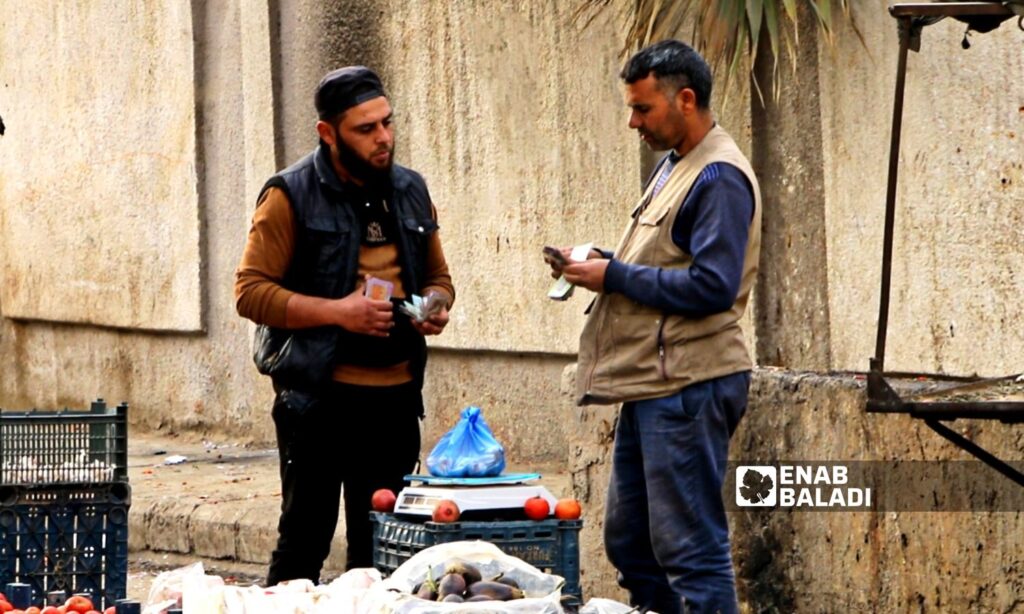The markets in the city of Ras al-Ain, northwest of al-Hasakah, are witnessing dissatisfaction among residents, as there have been no noticeable changes in the prices of goods, despite the improvement in the value of the Syrian pound over the past two months.
Some residents believe that the “slowness” in adjusting prices by traders increases their financial and living burdens and that the slight decrease in some goods is merely an “attempt to appease” at best.
Currently, one US dollar is equivalent to about 10,000 Syrian pounds, after being 15,500 pounds in December 2024, while its price against the Turkish lira is 35.88 pounds, according to the website “S-P Today,” which specializes in currency prices.
According to Enab Baladi’s observations, the price of a liter of vegetable oil has decreased slightly from 65,000 pounds to 60,000 pounds, while the price of a kilogram of sugar has dropped from 11,000 pounds to 8,000 pounds, and the price of a kilogram of tea has decreased by 6,000 pounds.
On the other hand, the prices of vegetables remain unchanged, with a kilogram of tomatoes priced at 14,000 pounds, cucumbers at 10,000 pounds, and potatoes at 7,000 pounds. As for sweets, there has been no drop in prices, as the minimum price remains at 40,000 pounds per kilogram, while medicine prices have increased by 20%.
Slight decrease in prices
From shop to shop, Adel al-Jassem (55 years old) searches for food items at reasonable prices, having noticed only slight differences in some basic items, mainly oil and sugar.
Al-Jassem told Enab Baladi that prices do not align with the rise in the value of the pound against the dollar, considering that consumers are subjected to a process of “scamming and emptying their pockets” by shop owners.
Meanwhile, Salma Murad (36 years old) is not fully pleased with the increase in teachers’ salaries to 4,850 Turkish lira, due to the depreciation of the Turkish lira against the Syrian pound, which has decreased from 450 to 250 Syrian pounds for each Turkish lira, while the prices of basic goods remain unchanged.
She stated to Enab Baladi that shops require payment in Syrian pounds, and if payment is made in Turkish lira, the amount is calculated at a multiplied rate, despite the fact that the Turkish lira has remained stable against the dollar.
She called for finding a solution to these conditions by forming committees to monitor markets and establish pricing by the relevant authorities to ensure price stability.
Vegetable prices remain stable despite the improvement in the value of the Syrian pound – February 9, 2025 (Enab Baladi)
“Traders control the price”
Traders in Ras al-Ain buy basic and food items and medicines in dollars, then sell them in the Syrian pound and Turkish lira to the residents, adding profits to the exchange rate and the price of sold goods, resulting in a continuous rise in the prices of commodities.
Izzat Karim, a shop owner in Ras al-Ain, stated that the unnoticeable decline in food prices is due to several reasons, the most important being that traders purchased goods when the dollar was high.
He explained that wholesale traders controlling the markets sell them food items and others at an elevated exchange rate of up to 16,000 Syrian pounds, making it difficult for retail shops to reduce prices.
Additionally, he noted that shop owners do not achieve more than a 15% profit on goods, while the real profits remain with suppliers and large traders who control the markets in Ras al-Ain.
He indicated that the rise in prices has led to stagnation in sales, especially as employees who depend on their salaries in Turkish lira can no longer make ends meet by mid-month, particularly with the stability of prices at their previous levels.
A number of traders with commercial licenses control the markets in Ras al-Ain, allowing them to enter Turkish territory to buy food items and more, then sell them at elevated prices compared to areas in northern Syria.
“Daily patrols and violations”
Mohammad al-Qadi, Deputy Director of Supply and Consumer Protection in the local council of Ras al-Ain, stated in a talk with Enab Baladi, that many traders in Ras al-Ain do not lower prices due to excessive greed and the pursuit of greater profits.
He explained that the Supply Directorate carries out daily patrols in collaboration with military institutions to monitor markets and control offenders who sell at high and unrealistic prices.
He added that the directorate records violations daily against offenders, in addition to monitoring markets and the exchange rates of the dollar among currency traders.
He pointed out that the existence of multiple currencies in circulation, such as the Syrian pound, the Turkish lira, and the dollar, creates a gap that some traders exploit to raise prices and increase their profits excessively.
The prices of goods are high compared to the living conditions of residents in Ras al-Ain – February 9, 2025 (Enab Baladi)
In light of the deteriorating economic and living conditions, buying used items has become a primary option for many families in Ras al-Ain, who seek to meet their needs at the lowest possible costs.
The trend is not limited to used clothes (the second-hand market) that see demand during the winter but also encompasses the sale of household items, which has proliferated in the city with its population of 115,000.
The city of Ras al-Ain is located in the north of al-Hasakah province, adjacent to the Turkish border, and is controlled by the Syrian National Army (SNA) supported by Turkey, while the Syrian Democratic Forces (SDF) controls the surrounding areas, making its only outlet the Turkish border, which does not provide adequate facilitation for the required support.

